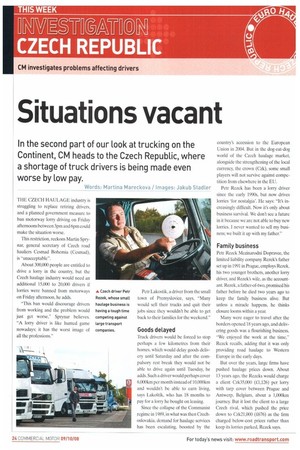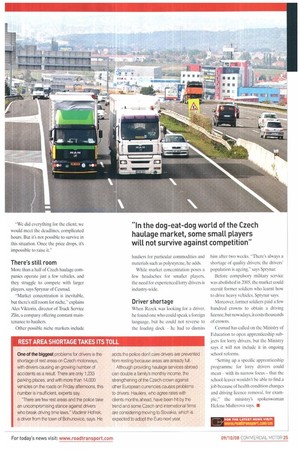Situations vacant
Page 24

Page 25

If you've noticed an error in this article please click here to report it so we can fix it.
In the second part of our look at trucking on the Continent, CM heads to the Czech Republic, where a shortage of truck drivers is being made even worse by low pay.
Words: Martina Mareckova / Images: Jakub Stadler
THE CZECH HAULAGE industry is struggling to replace retiring drivers, and a planned government measure to ban motorway lorry driving on Friday afternoons between 3pm and 6pm could make the situation worse.
This restriction, reckons Martin Sprynar, general secretary of Czech road hauliers Cesmad Bohemia (Cesmad), is "unacceptable".
About 300,000 people are entitled to drive a lorry in the country. but the Czech haulage industry would need an additional 15,000 to 20,000 drivers if lorries were banned from motorways on Friday afternoon, he adds.
-This ban would discourage drivers from working and the problem would just get worse," Sprynar believes. "A lorry driver is like hunted game nowadays: it has the worst image of all the professions. Petr Lakostik, a driver from the small town of Premyslovice, says. "Many would sell their trucks and quit their jobs since they wouldn't be able to get back to their families for the weekend."
Goods delayed
Truck drivers would be forced to stop perhaps a few kilometres from their homes, which would delay goods delivery until Saturday and after the compulsory rest break they would not be able to drive again until Tuesday, he adds. Such a driver would perhaps cover 6,000km per month instead of 10,000km and wouldn't be able to earn living, says Lako;tfk, who has 18 months to pay for a lorry he bought on leasing.
Since the collapse of the Communist regime in 1989, in what was then Czechoslovakia, demand for haulage services has been escalating, boosted by the country's accession to the European Union in 2004. But in the dog-eat-dog world of the Czech haulage market, alongside the strengthening of the local currency. the crown (Czk), some small players will not survive against competition from elsewhere in the EU.
Petr Rezek has been a lorry driver since the early 1990s, but now drives lorries 'for nostalgia'. He says: "It's increasingly difficult. Now it's only about business survival. We don't see a future in it because we are not able to buy new lorries. I never wanted to sell my business., we built it up with my father."
Family business
Petr Rezek Mezinarodni Dopravce, the limited liability company Rezek's father set up in 1991 in Prague, employs Rezek, his two younger brothers, another lorry driver, and Rezek's wife, as the accountant. Rezek, a father-of-two, promised his father before he died two years ago to keep the family business alive. But unless a miracle happens, he thinks closure looms within a year.
Many were eager to travel after the borders opened 18 years ago, and delivering goods was a flourishing business. "We enjoyed the work at the time." Rezek recalls, adding that it was only providing road haulage to Western Europe in the early days.
But over the years, large firms have pushed haulage prices down. About 13 years ago, the Rezeks would charge a client Czk35,000 (i1,126) per lorry with tarp cover between Prague and Antwerp. Belgium, about a 1,000km journey. But it lost the client to a large Czech rival, which pushed the price down to Czk21,000 (£676) as the firm charged below-cost prices rather than keep its lorries parked, Rezek says. We did everything for the client; we would meet the deadlines, complicated hours. But it's not possible to survive in this situation. Once the price drops, it's impossible to raise it."
There's stilt room
More than a half of Czech haulage companies operate just a few vehicles, and they struggle to compete with larger players, says Sprynar of Cesmad.
"Market concentration is inevitable, but there's still room for niche," explains Ales Viktorin, director of Truck Service Zlin, a company offering constant maintenance to hauliers.
Other possible niche markets include hauliers for particular commodities and materials such as polystyrene, he adds.
While market concentration poses a few headaches for smaller players, the need for experienced lorry drivers is industry-wide.
Driver shortage
When Rezek was looking for a driver, he found one who could speak a foreign language, but he could not reverse to the loading dock he had to dismiss him after two weeks. "There's always a shortage of quality drivers; the drivers' population is ageing," says Sprynar.
Before compulsory military service was abolished in 2005, the market could recruit former soldiers who learnt how to drive heavy vehicles. Sprynar says.
Moreover, former soldiers paid a few hundred crowns to obtain a driving licence, but nowadays, it costs thousands of crowns.
Cesm al has called on the Ministry of Education to open apprenticeship subjects for lorry drivers, but the Ministry says it will not include it in ongoing school reforms.
"Setting up a specific apprenticeship programme for lorry drivers could mean with its narrow focus that the school-leaver wouldn't be able to find a job because of health condition changes and driving licence removal, for example," the ministry's spokeswoman Helena Mullerova says. IN








































































































































































